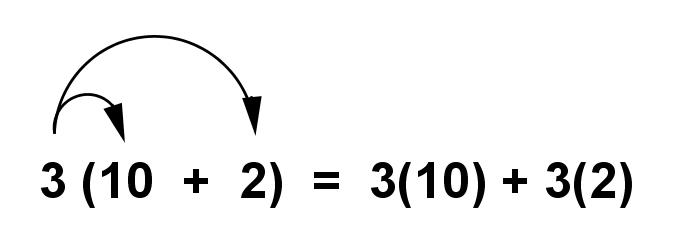WRITING EQUIVALENT EXPRESSIONS USING DISTRIBUTIVE PROPERTY
Subscribe to our ▶️ YouTube channel 🔴 for the latest videos, updates, and tips.
Already we know that multiplication is distributive over addition and subtraction.
We can use this distributive property to write equivalent algebraic expressions.
Distributive Property
Multiplying a number by a sum or difference is the same as multiplying by each number in the sum or difference and then adding or subtracting.
Examples :
6(2 + 4) = 6(2) + 6(4)
8(5 - 3) = 8(5) - 8(3)
Solved Problems
Problem 1 :
Use distributive property to write an expression that is equivalent to 3(10 + 2).
Solution :

Problem 2 :
Use distributive property to write an expression that is equivalent to 5(6 - 3).
Solution :

Problem 3 :
Use distributive property to write an expression that is equivalent to 7(x - 3).
Solution :
7(x - 3) = 7x - 7(3)
7(x - 3) = 7x - 21
Problem 4 :
Use distributive property to write an expression that is equivalent to 2(2x - 5).
Solution :
2(2x - 5) = 2(2x) - 2(5)
2(2x - 5) = 4x - 10
Problem 5 :
Use distributive property to write an expression that is equivalent to 3(x - 5).
Solution :
3(x - 5) = 3x - 3(5)
3(x - 5) = 3x - 15
Problem 6 :
Use distributive property to write an expression that is equivalent to 5x + 25.
Solution :
5x + 25 = 5x + 5(5)
5x + 25 = 5(x + 5)
Problem 7 :
Use distributive property to write an expression that is equivalent to 7y + 5y.
Solution :
7y + 5y = y(7 + 5)
Problem 8 :
Use distributive property to write an expression that is equivalent to 0.2y + z.
Solution :
0.2y + z = 0.2y + 1z
0.2y + z = 0.2y + 0.2(5z)
0.2y + z = 0.2(y + 5z)
Subscribe to our ▶️ YouTube channel 🔴 for the latest videos, updates, and tips.
Kindly mail your feedback to v4formath@gmail.com
We always appreciate your feedback.
About Us | Contact Us | Privacy Policy
©All rights reserved. onlinemath4all.com
Recent Articles
-
US Common Core K-12 Curriculum Algebra Solving Systems of Equations
Dec 19, 25 07:31 PM
US Common Core K-12 Curriculum Algebra Solving Systems of Equations (Grade - 8) -
10 Hard SAT Math Questions (Part - 40)
Dec 18, 25 06:27 PM
10 Hard SAT Math Questions (Part - 40) -
Digital SAT Math Problems and Solutions (Part - 13)
Dec 18, 25 12:26 PM
Digital SAT Math Problems and Solutions (Part - 13)
